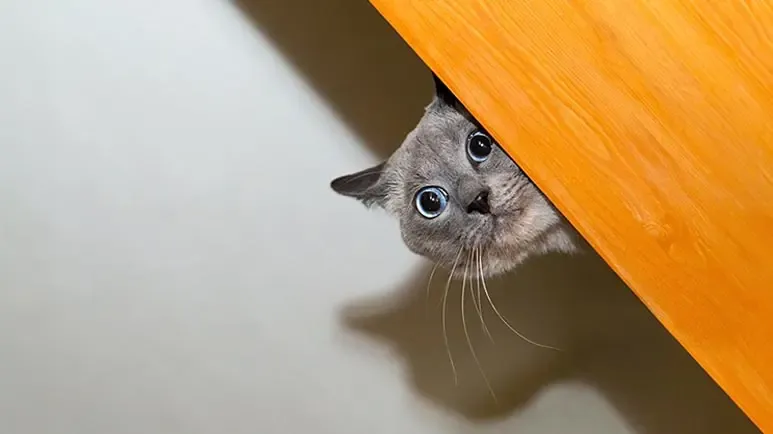How to Recognize the Subtle Signs of Stress in Cats
Changes in your cat's environment or routine can trigger anxiety and stress, making them irritable and agitated. Here’s how to bring back Zen in their lives.

STORY AT-A-GLANCE
- Stress in cats can be difficult to spot because the changes are subtle. Common causes include disruptions to their routine, loud noises, addition of new pets and environmental changes
- Signs of stress in cats manifest in their behavior, body language and health. These include aloofness, irritability, overgrooming, changes in body posture and various physical health issues
- To reduce stress in cats, modify their environment by addressing the five senses. Provide varied lighting, play calming music, use cat-friendly scents, offer physical affection and feed a species-appropriate diet
- Playtime is crucial for reducing stress and improving cats' quality of life. Aim for two to three 10-minute play sessions daily, and encourage independent play with cat trees or indoor jungle gyms
- A 2023 study found that cats without playtime exhibited stress-related behaviors. Regular play sessions, initiated by both cat and owner, were associated with better cat-guardian relationships and improved feline welfare
Most pet owners describe cats as “low maintenance” pets, compared to dogs. But just because they’re independent doesn’t mean they don’t get anxious, scared or stressed. In fact, cats are a very sensitive species.
What makes it difficult to spot stress in cats is that the changes are usually very subtle; they are easily missed by most pet parents. In this article, we’ll discuss some common causes and signs of stress in cats, and what you can do to make your kitty relaxed and comfortable again.
What Causes Stress in Cats?
Cat guardians are well aware that cats are highly independent creatures. Cats in the wild actually prefer exerting maximum control over their environment; they don’t depend on other creatures to survive. Even when they’re domesticated and treated as indoor companion animals, cats do not lose this natural instinct to control their environment.
So when you do something to disrupt the routine that they’re already comfortable with, it seems to them as if they’re losing control over their own survival. This then causes them to feel stressed and anxious.
There’s no one single cause of stress in kitties. Loud noises can be a stressor, as well as having guests over, a thunderstorm outside or simply being picked up by their owner. Cats could also suffer from separation anxiety, such as if they’ve been away from you for long periods of time.
Some kitties also become stressed from having a new family pet, or even because of a pet that they lived together with for years. The sight of their cat carrier, a trip to the vet or even new fragrances like scented candles can also be stress triggers — the list is endless.
Even small changes in their daily routine can trigger stress and make them jittery. Major changes, such as relocating to a new home, can be extremely nerve-wracking for your feline friends.
Signs of Stress in Cats to Watch Out For
When cats are stressed, the signs are not always noticeable, and oftentimes, you will need to look closely to spot the changes. Symptoms vary from cat to cat, so if you have more than one kitty in your home, the way one shows they’re stressed could be different from how the other cat(s) may behave.
Nevertheless, there are three areas that are affected — their behavior, body language and health.1 Common behavior changes in a stressed kitty include being aloof; you’ll notice that your normally sociable kitty is suddenly avoiding you or other people, refusing to interact with anyone. They could hide away for long periods of time, and when it’s time for them to go outdoors, they’ll refuse.
Cats that are stressed also appear more irritable or agitated, whether toward people or other pets. They also overgroom themselves, scratch your furniture, or purr or yowl more frequently. They may also pee or poop inside your home or outside the litter box. As for their body language, observe them closely for these symptoms:
- Tensed and hunched up body
- Dilated pupils
- Flattened ears
- Skin twitching (rippling)
- Swallowing more than usual
- Licking their lips constantly
Constant stress will eventually affect your pet physically, and this manifests as different types of health problems, such as:
- Diarrhea
- Skin issues
- Urinary tract issues or cystitis
- Digestive problems
Constantly stressed kitties usually appear to have a general decline in their health. They could also lose their appetite, which further affects the state of their well-being.
Stress Reduction Techniques for Cats
When humans become stressed, they usually turn to activities that make them feel relaxed and calm their mind. Yoga, meditation classes, deep breathing exercises, learning a new hobby such as painting or knitting, going for a run or a walk, or exercising regularly are some examples of stress-busting activities humans engage in.
With cats, it’s slightly different. What you need to do is to make changes to their environment; think about how they experience their living situation using the five senses (touch, sight, smell, taste and hearing) and adjust these to what suits your cat, allowing them to feel comfortable and serene. Here are some ideas for you to try:
- Reduce visual stress by creating variety into the lighting your cat is exposed to using boxes, tunnels or perches in different parts of the house. You can also set up a window perch where your kitty can relax and peer out the window to the outside world.
- Reduce auditory stress by playing slow, relaxing classical music. Reduce the volume of your TV and sound system and refrain from having loud arguments inside your home.
- Some scents are stressful for kitties — colognes, air fresheners, scented candles, cleaning products and cigarette smoke are particular stressors. Instead, place scents that cats prefer around your home. These include catnip, lavender and chamomile flowers. Or better yet, improve the quality of your indoor air.
- If your cat likes to be touched, try petting, cuddling or brushing them. It will not only reduce their stress levels, but will also strengthen the bond between the two of you.
- Feed your carnivorous cat a species-appropriate diet, one that’s high in animal protein and moisture, to help improve health-related signs of stress.
- Consider trying acupuncture or chiropractic care with an integrative veterinarian to further reduce stress in your cat.
Playtime with Kitty Also Relieves Stress
A 2023 study2 conducted by Australian researchers investigated the effects of playtime on the health and quality of life of cats. One of their findings was that cats that didn’t get any playtime showed stress-related behavioral changes, unease and frustration. This led the researchers to conclude that playtime is a very important factor in both assessing a cat’s welfare and maintaining it. Julia Henning, a Ph.D. candidate and the lead study author, said:
"Our survey results, based on responses from 591 cat guardians from 55 countries, indicated greater cat playfulness and more types of games played were significantly associated with better cat quality of life.
Also, longer amounts of daily play, greater number of games, both cat and guardian initiating play, and heightened guardian playfulness were also associated with better quality cat-guardian relationships."3
Hence, make sure to encourage playtime sessions with your cat. At least two or three 10-minute daily sessions will suffice; if possible, schedule them at the same time each day so your cat learns to look forward to them. There are plenty of interactive toys you can use, but make sure to choose all-natural, chemical-free ones.
It’s also a good idea to encourage independent playtime. Set up an indoor cat tree or make a jungle gym using recycled cardboard boxes for them to play in. For outdoor playtime, set up a cat patio, or a “catio,” that gives your kitty safe access to the outdoors without the risk of free roaming.











